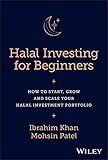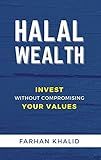Best Halal Mutual Funds to Buy in February 2026
Halal mutual funds for ethical investing are investment vehicles that comply with Islamic principles, particularly the avoidance of interest (riba), gambling (maysir), and unethical industries such as alcohol, tobacco, and weapons. These funds focus on socially responsible investing by ensuring that their portfolios align with Shariah law. They predominantly invest in equities of companies that demonstrate ethical practices, have low debt levels, and engage in permissible business activities. Many financial institutions offer Islamic-compliant mutual funds that undergo regular Shariah audits to ensure adherence to these principles. As the popularity of ethical investing grows, a wider variety of halal mutual funds are becoming available worldwide, providing opportunities for investors who seek to align their financial goals with their values. Investors are advised to review the specific criteria and holdings of each mutual fund to ensure they meet both financial objectives and ethical standards.
What is a Shariah-compliant index fund?
A Shariah-compliant index fund is a type of investment fund that aims to replicate the performance of a benchmark index while adhering to the principles of Shariah, which is Islamic law. These funds are designed to provide Muslim investors with investment opportunities that comply with Islamic ethical guidelines.
Key features of a Shariah-compliant index fund include:
- Exclusion of Prohibited Industries: The fund screens out companies involved in activities that are considered haram (forbidden) under Islamic law. This typically includes businesses involved in alcohol, gambling, pork, tobacco, and interest-based financial services.
- Financial Ratios: The fund applies specific financial ratio screens to ensure compliance with Islamic finance principles. For example, companies with excessive levels of debt (interest-based) or certain types of non-permissible income might be excluded.
- Ethical Investment Approach: The fund invests in companies that operate according to ethical business practices, emphasizing fairness, transparency, and social responsibility.
- Shariah Board: A board of Shariah scholars typically oversees the selection of stocks to ensure compliance with Islamic principles. This board regularly reviews the fund's holdings to maintain Shariah compliance.
- Dividend Purification: Any income that is deemed non-compliant, such as interest earned, is usually purified, which often involves donating it to charity.
Overall, Shariah-compliant index funds provide Muslim and ethical investors with a way to invest in the stock market while adhering to their religious or ethical beliefs.
How to balance risk and ethical considerations in investing?
Balancing risk and ethical considerations in investing is an important aspect for investors who wish to align their portfolios with their values while also seeking financial returns. Here are some strategies to achieve this balance:
- Define Ethical Criteria: Identify what ethical considerations matter most to you. This could include environmental sustainability, social impact, corporate governance, or other factors such as labor rights and community involvement. This forms the basis for your investment choices.
- Risk Assessment and Tolerance: Understand your risk tolerance, which is the level of risk you are comfortable taking. Consider factors such as your investment horizon, financial goals, and personal circumstances. Diversification can also help mitigate risk.
- Research Ethical Investment Options: Look into socially responsible investing (SRI) funds, environmental, social, and governance (ESG) funds, or impact investing options. These funds typically screen companies based on ethical criteria and aim to deliver competitive financial returns.
- Perform Due Diligence: Conduct thorough research on potential investments. Evaluate not only the financial performance but also the company’s ethical practices and commitments. This may include reading sustainability reports, analyzing third-party ratings, or checking for certifications.
- Portfolio Diversification: Balance your portfolio by investing in a mix of asset classes and sectors. Diversification can reduce risk while still allowing you to include investments that meet your ethical criteria.
- Engage with Companies: Use your influence as an investor to engage with companies on their ethical practices. Voting on shareholder resolutions and participating in dialogues can encourage companies to improve their ESG practices.
- Ongoing Monitoring and Adjustment: Regularly review your investments to ensure they continue to meet both your ethical and financial criteria. The landscape of both ethical considerations and financial performance can change, requiring adjustments to your portfolio.
- Consult Experts: Engage with financial advisors or firms that specialize in ethical investing. They can provide insights into balancing risk and ethics based on market trends, emerging risks, and opportunities aligned with your values.
- Evaluate Long-term Impact and Returns: Consider the long-term impact of your investments. Ethical investments might offer stability and potential for long-term growth, particularly as more consumers and businesses emphasize sustainability.
By integrating these strategies, you can create an investment portfolio that is not only aligned with your ethical values but also positioned to manage risk and achieve your financial goals.
What is the process for purifying profits in Islamic investing?
Purifying profits in Islamic investing is an essential practice to ensure compliance with Shariah law, which prohibits certain activities and earnings. Here's a general process that investors typically follow:
- Shariah-Compliant Screening: Before investing, ensure that companies meet Shariah guidelines. These include avoiding businesses involved in alcohol, gambling, pork products, conventional financial services like interest-based banks, and other non-compliant activities.
- Financial Screening: Assess the financial ratios of companies, such as debt-to-equity, cash-to-total assets, and accounts receivable. Companies should have low levels of interest-bearing debt and avoid excessive receivables or income from non-compliant activities.
- Identification of Non-Compliant Income: Once investments are made, identify any portion of income derived from impermissible sources. This could include interest income or earnings from activities not compliant with Shariah principles.
- Calculation of Impure Income: Calculate the exact amount of non-compliant income. This is often done based on financial statements or specific guidance provided by Shariah advisors or Islamic finance scholars.
- Purification Process: Purify the impure income by donating the equivalent amount to charity. It is important to note that this donation should not be made to a charity where the investor stands to gain any benefit; it should be purely for purification purposes.
- Record Keeping and Reporting: Maintain records of the purification process and report any impurities to stakeholders, ensuring transparency in actions taken to remain compliant with Islamic principles.
- Continuous Monitoring: Regularly review investments and keep abreast of any changes in the business operations of the companies or Shariah guidelines to ensure ongoing compliance.
Consulting with a qualified Shariah advisor or an Islamic financial institution can provide additional assurance and detailed guidance tailored to individual circumstances.
What is the impact of interest (riba) in Islamic finance?
In Islamic finance, interest, or "riba," is strictly prohibited and is considered a major sin. The concept of riba is believed to lead to injustice and is viewed as exploitative. The prohibition of riba has significant impacts on how financial products and services are structured within Islamic finance. Here are a few key points regarding its impact:
- Prohibition of Interest-Based Products: Traditional interest-based financial products like savings accounts, loans, and bonds are not compatible with Islamic finance principles. Instead, alternative models such as profit-sharing or lease-based contracts are utilized.
- Promotes Equity and Risk Sharing: Instead of earning through interest, Islamic finance promotes models based on equity participation, where the provider of capital and the entrepreneur share the business risk and rewards. This is usually achieved through contracts like Musharakah (joint venture) and Mudarabah (profit-sharing).
- Asset-Backed Financing: Islamic finance emphasizes asset-backed financing, ensuring that financial transactions are supported by tangible assets or services. This is in contrast to conventional finance, where money itself can be a commodity.
- Ethical Investments: The prohibition of riba is part of a broader framework of ethical and socially responsible investing. Islamic finance seeks to promote investments that align with moral and ethical values, such as avoiding businesses that deal in alcohol, gambling, and tobacco.
- Stability and Sustainable Growth: Proponents believe that by prohibiting riba and focusing on risk-sharing and ethical investments, Islamic finance can contribute to more stable and sustainable economic growth, as it discourages excessive risk-taking and speculation.
- Financial Inclusion: Islamic finance can also enhance financial inclusion by providing access to financial services for Muslims who wish to avoid interest-based transactions and others who are attracted to its ethical focus.
Overall, the impact of riba in Islamic finance leads to the development of unique financial instruments and institutions that emphasize ethical standards, fairness, and shared risk, differentiating it significantly from conventional finance systems.
What is a sukuk?
A sukuk is a financial instrument that represents a share of ownership in a tangible asset, a specific project, or a particular investment activity that complies with Islamic law, or Shariah. Similar to a bond in Western finance, sukuk are used to raise capital for various projects while adhering to the principles of Islamic finance, which prohibits the charging or payment of interest (riba).
Instead of earning interest, sukuk holders receive a share of the profits or rental income generated by the underlying assets. The key difference is that sukuk represent an ownership stake in real assets, whereas conventional bonds are debt certificates with promised interest payments. This structure is designed to ensure that the investments align with ethical and equitable principles, conforming to the risk-sharing and profit-sharing ethos of Islamic finance.
How to start halal investing?
Halal investing refers to making investments that are compliant with Islamic principles, meaning they adhere to Shariah law. Here are some steps to start halal investing:
- Educate Yourself: Understand the basics of halal investing and Shariah law. It's important to know what makes an investment halal or haram (forbidden). Key principles include avoiding investments in businesses involved in alcohol, gambling, pork, interest-based financial services, and other non-compliant activities.
- Consult a Financial Advisor: Consider speaking with a financial advisor or an expert in Islamic finance. They can provide personalized advice and help you align your investment strategy with your religious beliefs.
- Determine Your Investment Goals: Define what you are hoping to achieve with your investments. Are you looking for long-term growth, passive income, or a combination of both?
- Choose Halal Investment Products: Islamic Mutual Funds and ETFs: These funds pool money from investors to buy a diversified portfolio of stocks and/or bonds that are screened for compliance with Islamic principles. Shariah-Compliant Stocks: Invest in companies that pass the criteria for Shariah compliance. Sukuk (Islamic Bonds): Sukuk are Islamic financial certificates similar to bonds but structured to comply with Shariah law.
- Perform Shariah Screening: Conduct or ensure there’s a Shariah screening process involved. This typically includes: Industry Screening: Excluding businesses in non-permissible sectors. Financial Screening: Ensuring companies don't have excessive levels of debt or impure interest income.
- Choose a Halal Investment Platform: Look for online platforms or brokers that specialize in or offer options for halal investing. Make sure they have a Shariah board or consult with scholars to ensure compliance.
- Monitor and Rebalance Your Portfolio: Regularly review your investment portfolio to ensure it remains aligned with your goals and remains compliant with Islamic principles.
- Stay Informed: Keep up with changes in halal investing guidelines as well as global financial markets to make informed decisions.
- Community and Networking: Engage with the community of halal investors through forums and groups to share insights and learn from others.
By following these steps, you can align your financial goals with your ethical and religious values, contributing to both material and spiritual well-being. Remember that, like all investments, halal investing carries risks, and it’s important to do thorough research or seek professional advice.




